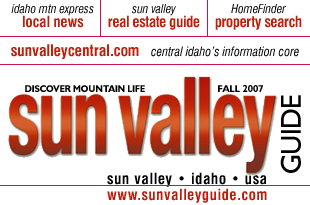
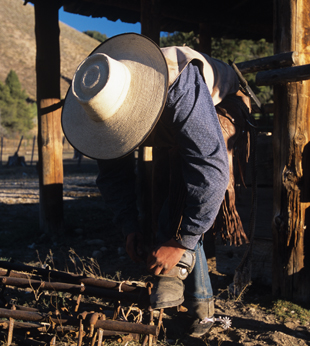
Photos by Todd Kaplan
Boone Campbell
The Business of Being a Cowboy
Boone Campbell, graduate of
Silver Creek Alternative School, has faced some tough choices. The most
important one, however,
was made a long time ago.
Van Gordon Sauter
steps into the taciturn world of a tried and true cowboy. Photos by Todd Kaplan.It is a scene from a Clint Eastwood movie: a deceptively quiet high-country tableau, revealing a creek of snowmelt racing through a forest toward flat country and bone-dry homesteaders. On both sides of the stream is a chaotic gauntlet of river rocks, focusing the stream’s path and separating it from a first growth of sturdy, straight trees.
And then, before any intrusion of noise, the roosting
birds suddenly take flight. Deep in the stream, sensing the rapidly
escalating reverberations, the trout break into frantic motion, diving
for cover. The small creatures, the voles and squirrels, move away from
what is now the thudding sound of hooves pounding along a narrow dirt
path through the forest.
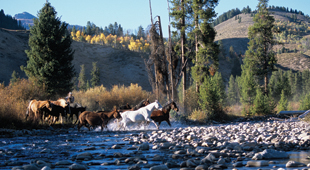
Then the horses burst from the trees, leaning forward, dashing into the stream, throwing up showers of water, welcoming the chill. Behind them is a tall man riding easily on a sturdy bay, a white hat low on his forehead, a long coat lifting in his wake. He whistles and shouts, urging the animals through the stream and into the trees. Barely slowed by the water, the horses churn onto the far bank and disappear into the forest.
Boone Campbell, cowboy, takes his time fording the stream, allowing his horse an extra ration of coolness. It is miles to the high camp and in the stretches above the trees; it will be a challenge keeping the horses together. Boone, wrangler for a big-game hunting outfit, is high in the Soldier Mountains, north of the Camas Prairie, west of the resort towns of Ketchum and Sun Valley.
Boone, 22, has choices. He could go to college. Or service the tourists who pour into the gilded towns of the Wood River Valley, becoming a central casting cowboy for awestruck boys usually preoccupied with handheld games.
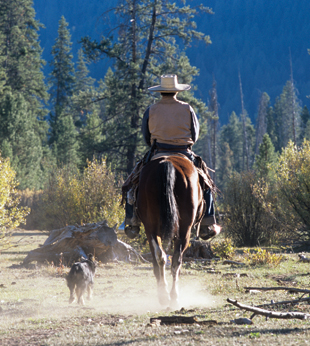
But Boone, who was raised in Hailey, where his father and paternal grandparents still live, rejected both, throwing in his lot with the life and dusty romance of the calloused, hardscrabble cowboy. And so he lives, amidst the wonderful isolation and beauty of daunting mountain ranges that most people see only from scenic highways or jets, from which those arrowhead granite peaks give way to impenetrable forests with the blue veins of water coursing toward magical waterways such as the Snake and the Boise and the Big Wood and the Clearwater—waterways writ large with history and romance. And blood.
Boone is tall and strapping. Appropriate to his calling, he is quiet. He defines taciturn. And he is innately gentle, though one senses the strength that muscles a recalcitrant horse or field dresses an elk or instills confidence in a greenhorn on his first bear hunt. For all its drama and occasional tumult, his life is simpleto someone outside it, painfully simple.
"Every once and a while I think about college," he says. "I probably ought to go. Then I figure out I really like what I do." His home during a recent hunting season was a dug-out log cabin, sort of a dirt basement with shallow walls and a flimsy roof, adjacent to the corrals and supply sheds of the base camp. One takes two steep steps down into the old cabin, where Boone’s wide-brimmed hat has clearance of a fraction of an inch. It is dark with a damp earthy aroma.
"Don’t spend time here," Boone says, explaining why the primitive accommodations are irrelevant. When he is there, he reads by the light of a dusty oil lantern. A mentor, from the Silver Creek Alternative School from which he graduated, brings him the great books about young men moving through that abrupt and treacherous transition between callow youth and serious, field-tested adulthood—the decisive young men of Ernest Hemingway and Jack London and Zane Gray. Boone has made that journey and is comfortable in his newly acquired adulthood, and the righteousness of his choices.
There is no room in this shallow residence, let alone the daily challenges of his calling, for tales of overtly sensitive young men in pricey Italian suits struggling with urban neuroses. Boone goes to work wearing a sidearm and a knife of near-bayonet proportions.
Self-sufficiency is the skill set at the top of his qualifications. Boone’s world changes when the snows come to the high country—which is early. One recent winter, he left the outfitter’s world to wrangle huge draft horses ("Clydes and Belgians and shires," he says) that pull sleds loaded with tourists from an elegant resort across fields of deep snow to a rustic cabin where they enjoy dinner and entertainment.
"Pretty intelligent horses," Boone said admiringly. "Like to work." No such compliment was extended to some of the young people dragooned into taking the ride by their doting parents. "Spoiled. Quite a number of them. But then, quite a few of them enjoyed the horses." But resort life wasn’t for Boone. Too many cars. Too many people. Too many people who don’t understand the West, at least the West that Boone inhabits in his mind and his lifestyle.
Another time, Boone worked a ranch near Paisley, Oregon, a small town far to the southeast of Portland. A symbol of Paisley’s remoteness is that the town holds an annual mosquito festival. This is hardly the Oregon of mini breweries or beaches or gin-clear trout streams. This is cow country.
Boone and three other hands worked sections of a massive ranch. His best buddy worked another section, in some places a couple of hours away on ranch roads. They might have seen each other once a week.
Boone pulled 12-hour shifts, marshalling his section, sometimes on a horse, sometimes in a truck, always on the lookout for cows in trouble, particularly those having difficulty calving. Some shifts he helped deliver five or six calves; others, just one.
But it’s shift upon shift. A break in the routine might be a traveling minister visiting one of the area ranches. Boone tries to make the makeshift services. "We don’t have TV here," he says. "Anyway, I’m just fine not being part of that world."
Boone senses that some people are stunned by the simplicity and yet the incredible texture of his life. "I like the freedom," he explains. "You’re not tied down. You can just pack up and move on when you feel like it. I like open country.
"It’s not a good place unless you like working with horses. With cows. And you gotta love learning. There is so much to learn out here. Never ends." Neither does the vulnerability.
This past winter, a horse fell on Boone, breaking his leg in two places. A broken leg is treacherous on a ski mountain. On a remote ranch, in the backcountry, it can be fatal. Fortunately, he was working with another cowhand, who constructed a splint out of some large wrenches wrapped in canvas. He loaded Boone—no easy task in itself—into the back of a truck and drove him 40 miles to the nearest hospital. He was then airlifted to a more sophisticated hospital. Boone recovered on a ranch near the Oregon town of Adel, working as an apprentice to an area artisan who weaves very elaborate horsehair-and-rawhide bracelets and hatbands. Boone is now back in the saddle, working cows.
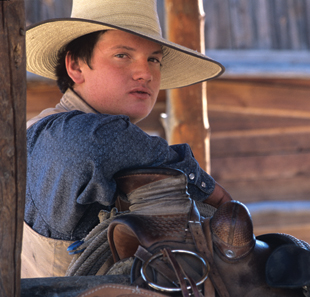
What does the future hold for Boone?
It brings to mind those old black-and-white Western movies in which the cowhand ultimately must decide between moving to town and courting the schoolmarm, or going on with the cattle drive to the Kansas City railhead.
It is not a simple choice. And one senses that in coming years the pressure of ranch life versus town life will fall heavily upon Boone. But one is inclined to believe that, say, five years from now, Boone will be working a dusty spread in Oregon or Idaho, perhaps his own, riding at dusk, looking out from a ridgeline at the lights of a distant town or an interstate highway, maybe a few vague glimpses of emblematic neon—the signs of the comfort and indulgences and companionship of town life. The line cabin where he probably spends the night has no electricity. No running water, nor, in the morning, the gentle presence of a caring woman and the aroma of bacon and flapjacks.
Again, the question.
But most likely he will pause only momentarily on that ridgeline, before turning his horse away, away from the flickering lights and seductive neon, back to the herd and the business of being a cowboy.
